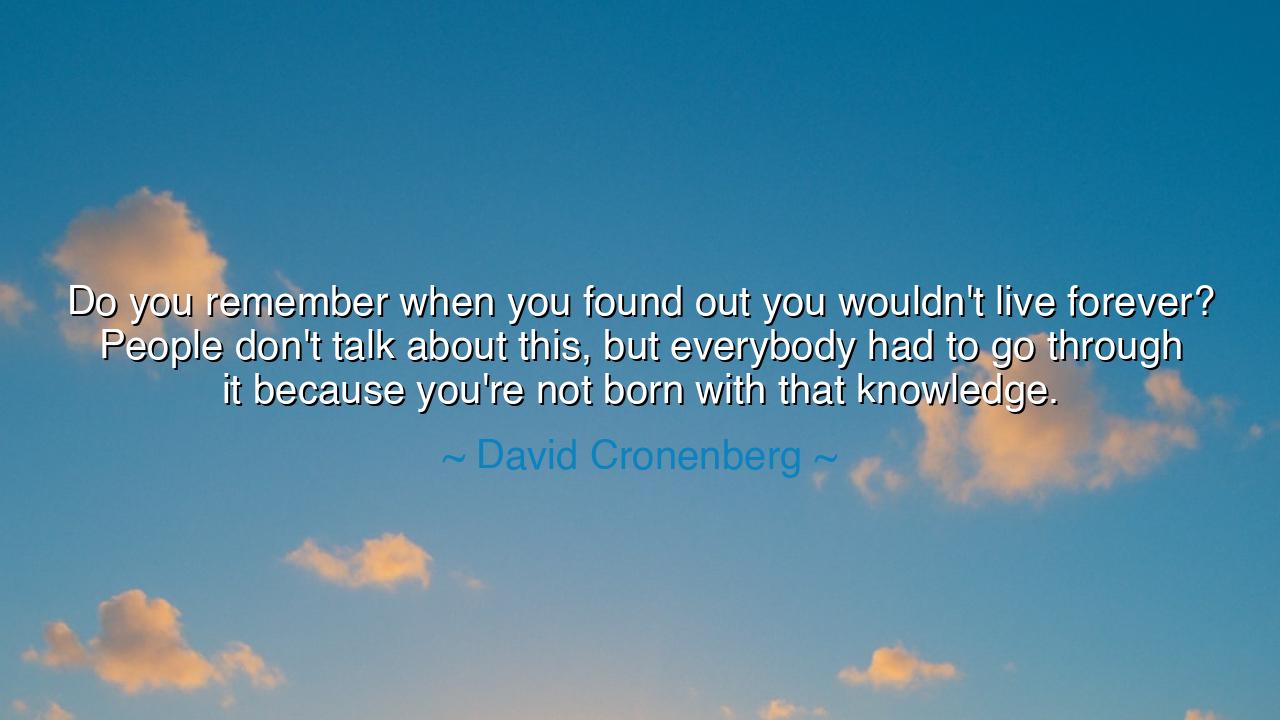
Do you remember when you found out you wouldn't live forever?
Do you remember when you found out you wouldn't live forever? People don't talk about this, but everybody had to go through it because you're not born with that knowledge.






When David Cronenberg asks, “Do you remember when you found out you wouldn’t live forever? People don’t talk about this, but everybody had to go through it because you’re not born with that knowledge,” he speaks not merely of mortality, but of awakening — that quiet, shattering moment in the soul when innocence meets truth. A child lives in eternity, believing the world unbreakable, their laughter endless. Then, one day, the veil lifts, and the heart learns what the mind cannot yet bear: that time is a river flowing one way, and that every life — no matter how bright — must one day fade into dusk. This realization is the first initiation into human wisdom, the moment when the immortal child begins the journey toward becoming a mortal sage.
The origin of the quote lies in Cronenberg’s lifelong meditation on death and transformation, themes that echo through his films and philosophy. Known for exploring the fragility of the human body and the illusions of permanence, Cronenberg sees mortality not as terror but as revelation. To “find out you wouldn’t live forever” is to step into the truth that binds all beings. It is the same realization that ancient philosophers called memento mori — the remembrance of death. But for Cronenberg, it is not a symbol carved in skulls or stone; it is a memory we all share — that moment of loss, confusion, and awakening when the infinite becomes finite, and we learn the weight of our days.
In the ancient world, this awakening was not feared but revered. The Egyptians built their wisdom around the tomb, not because they worshiped death, but because they understood life’s brevity gave it meaning. To meditate upon mortality was not morbid — it was to be free from delusion. Socrates, facing his own death, told his students that philosophy itself was a preparation for dying. He did not mean despair, but detachment — the art of living fully by accepting the end fully. So too, Cronenberg’s question is not meant to sadden, but to awaken: Do you remember that moment? For in remembering it, you remember who you are — a fleeting spark aware of its own light.
Each person must face this revelation alone. It often comes in childhood, like a shadow suddenly cast across a bright morning — the death of a pet, the illness of a parent, the first funeral. The heart struggles to comprehend what the mind cannot yet name. And yet, through this grief, the spirit grows. For to know that life ends is to begin to cherish it. Before that moment, we live carelessly, as if time were an endless sea; after it, we live deliberately, as if each breath were a tide receding. Mortality, when understood, becomes the teacher of gratitude.
History is filled with those who found greatness in this very understanding. When Marcus Aurelius, the philosopher-emperor, wrote his Meditations, he reminded himself daily that he was dust and breath. Yet from that awareness, he governed with patience, humility, and mercy. Knowing he would not live forever did not weaken him — it strengthened his virtue. For those who remember death no longer waste time on trivial quarrels or vanity; they live with clarity, aware that every moment is a chance to love, to learn, to leave light behind.
Cronenberg’s reflection thus belongs to a lineage of eternal wisdom — from the Stoics to the Buddhists, from poets to mystics — all who have learned that the discovery of mortality is not the end of innocence, but the beginning of meaning. It is the point where existence transforms from a careless dream into a conscious act. To realize that you will not live forever is to finally understand the sacredness of now — to stop postponing joy, forgiveness, and creation. For time, once unseen, becomes the most precious thing we possess.
So let the lesson be this: remember your mortality not with fear, but with fire. Recall the day you learned that you would not live forever — not as a wound, but as a gift. Let it remind you that your hours are numbered, and therefore infinite in worth. Speak truth while you can. Hold those you love. Create something that outlives your hands. The ancients knew, and Cronenberg reminds us still: to face death is not to die early, but to live deeply — for only those who know the end truly know how to begin.






AAdministratorAdministrator
Welcome, honored guests. Please leave a comment, we will respond soon